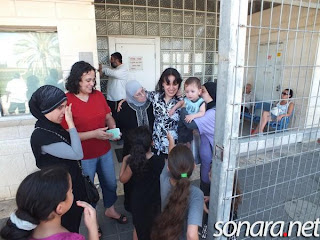اعلنت هيئة البورد الضامنة لقوانين اللعب في
الاتحاد الدولي لكرة القدم (فيفا) في مؤتمر صحافي عقب اجتماعها اليوم
الخميس في زيوريخ السماح للاعبات بارتداء الحجاب.
وكان هذا الاجراء الذي اتخذ بناء على طلب من الاتحاد الاسيوي للعبة
والامير علي بن الحسين، احد نواب رئيس الفيفا الستة، حصل في آذار/مارس
الماضي على "اتفاق مبدئي" من هيئة البورد التي رغبت في انتظار "نتيجة دراسة
سريعة لجميع المواضيع المتعلقة بهذه المسألة خصوصا على صعيد الصحة
والامن".
كما أقر مجلس الاتحاد الدولي لكرة القدم استخدام تقنية مراقبة خط المرمى..
وكان سيب بلاتر رئيس الاتحاد الدولي (الفيفا) معارضا لاستخدام تقنية خط
المرمى في السابق لكنه تراجع عن موقفه وأكد دعم الاتحاد لاستخدامها بعد
حادث في بطولة اوروبا 2012 حين بدا واضحا أن تسديدة ماركو ديفيتش لاعب
اوكرانيا عبرت خط المرمى قبل أن يبعدها جون تيري مدافع انجلترا.
FIFA lifts ban on hijab for women footballers
DUBAI / ZURICH: A ban on
the use of the Islamic headscarf, or hijab, for Muslim women footballers
was lifted by the sport’s rulemakers on Thursday.
The garment had previously been banned due to safety concerns and because it was not recognised in the laws of the game.
The International Football Association Board (IFAB) unanimously
overturned the ban and agreed to re-write the laws after studying
reports from FIFA’s medical officer.
“Safety and medical issues have been removed for the use of the
headscarf and it is approved that players can have the head scarf,” FIFA
secretary general Jerome Valcke told reporters.
He said a further meeting in October would discuss the details.
“The only remaining point now is now the colour and design of the headscarf,” he said.
The move came after a campaign in favour of the hijab from FIFA
vice-president and executive committee member Prince Ali Bin Al-Hussein
of Jordan.
Other sports such as rugby and taekwondo already allow the use of the hijab.
Last year the women’s football team from Iran were prevented from
playing their 2012 Olympic second round qualifying match against Jordan
because they refused to remove their hijabs before kickoff.
Iran, who had topped their group in the first round of Olympic
qualifiers, were punished with an automatic 3-0 defeat, which abruptly
ended their dreams of qualifying for the London games.
IFAB, founded in 1886, is football’s ultimate law-making body,
comprising four members from FIFA and four from the British
associations.
Gulf states applaud FIFA’s Muslim veil decision
The decision by world footballing authorities to overturn a ban on
women football players wearing the Islamic headscarf was welcomed by
several Arab states Thursday.
The International Football Association Board (IFAB), custodians of
the rules of football, overturned its 2007 ban on the Islamic headscarf,
or hijab, which it had argued was unsafe and increased the risk of neck
injuries. New designs are secured with Velcro that experts have said
eliminate the risk of serious injury.
Critics said the ban promoted inequality at the highest level of the world’s most popular game.
“This decision, impatiently awaited, makes us very happy,” said
Sheikha Naima al-Sabah, the president of the women’s sporting committee
for Kuwait’s football federation.
“It brings justice to female players. Its positive impact will be
direct on Kuwaiti women’s enthusiasm to play football,” Sabah added.
The Kuwaiti women’s football team, like those of the United Arab
Emirates, Qatar and Bahrain, plays in various international
competitions.
Oman does not field a women’s team, neither does Saudi Arabia, the most conservative of six monarchies in the Arabian Peninsula.
Riyadh has yet to confirm if it will send any women athletes to
compete in the London Olympics, and Saudi officials declined to comment
to AFP on FIFA’s scrapping of the hijab ban.
Sabah said FIFA’s decision establishes new “respect for different
religions, with the veil ban being until now a barrier for Kuwaiti
women”.
Iran was at the forefront of the fight against the veil ban. It had
complained to FIFA after its women’s team was banned in June 2011 from
playing in a qualifier against Jordan for the London Olympics.
Boon to women’s football in the Gulf
FIFA’s decision is “going to promote women’s sport in Arab and
Islamic countries, which have top-notch football players who are unable
to compete because of the veil ban”, said Adel Marzouq, coach of the
women’s football team from Bahrain.
“This wise decision will encourage footballers to play their chosen sport without embarrassment,” he added.
In the United Arab Emirates, where football is encouraged from an
early age, women will from now on have the “chance to practice this
sport with religious respect”, said Yussef Abdallah, the head of the
country’s football federation.
In neighbouring Qatar, the tiny, gas-rich nation that will host the
2022 World Cup and which encourages women’s sport, the relief was clear.
“FIFA was assured that the headscarf doesn’t impact security, which
will allow women footballers to freely practice their sport,” said Hani
Ballan, Qatar’s technical advisor for women’s football.
“The number of women playing football is going to grow, along with
the support of families, footballing federations and sporting bodies
worried about Muslim identity,” Ballan added.
The wearing of the Islamic veil, limited historically to conservative
Gulf monarchies, has gained ground, including in sports, since the 1979
Iranian Revolution and the creation of an Islamic republic.
Use of the veil spread quickly as Islamist movements grew in the wake of last year’s Arab Spring uprisings.













































